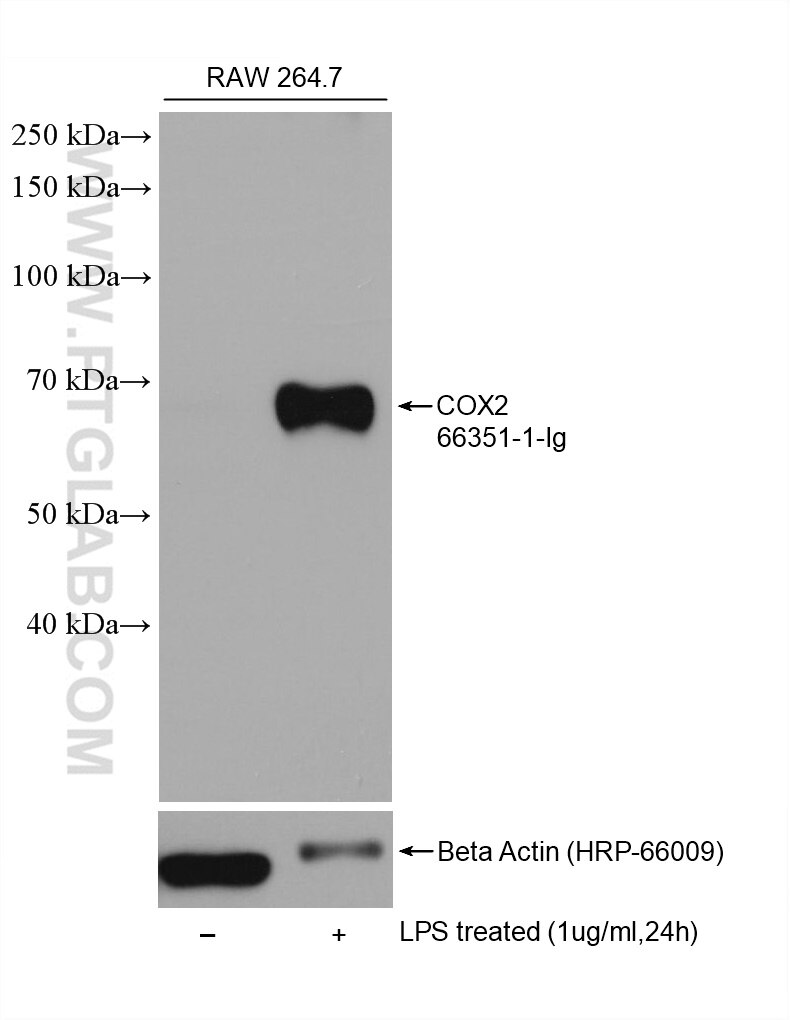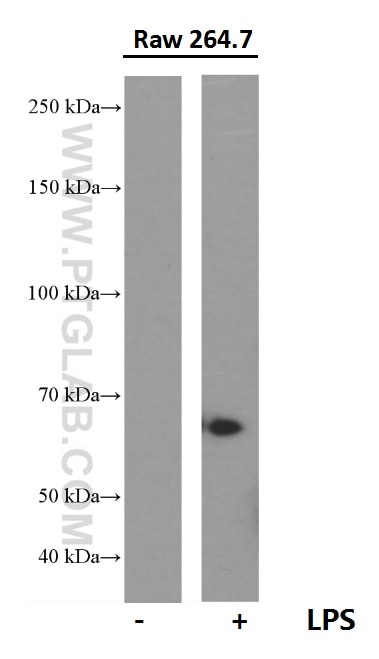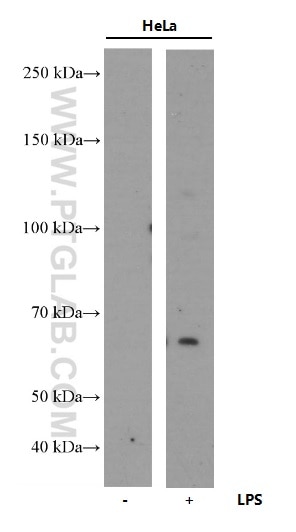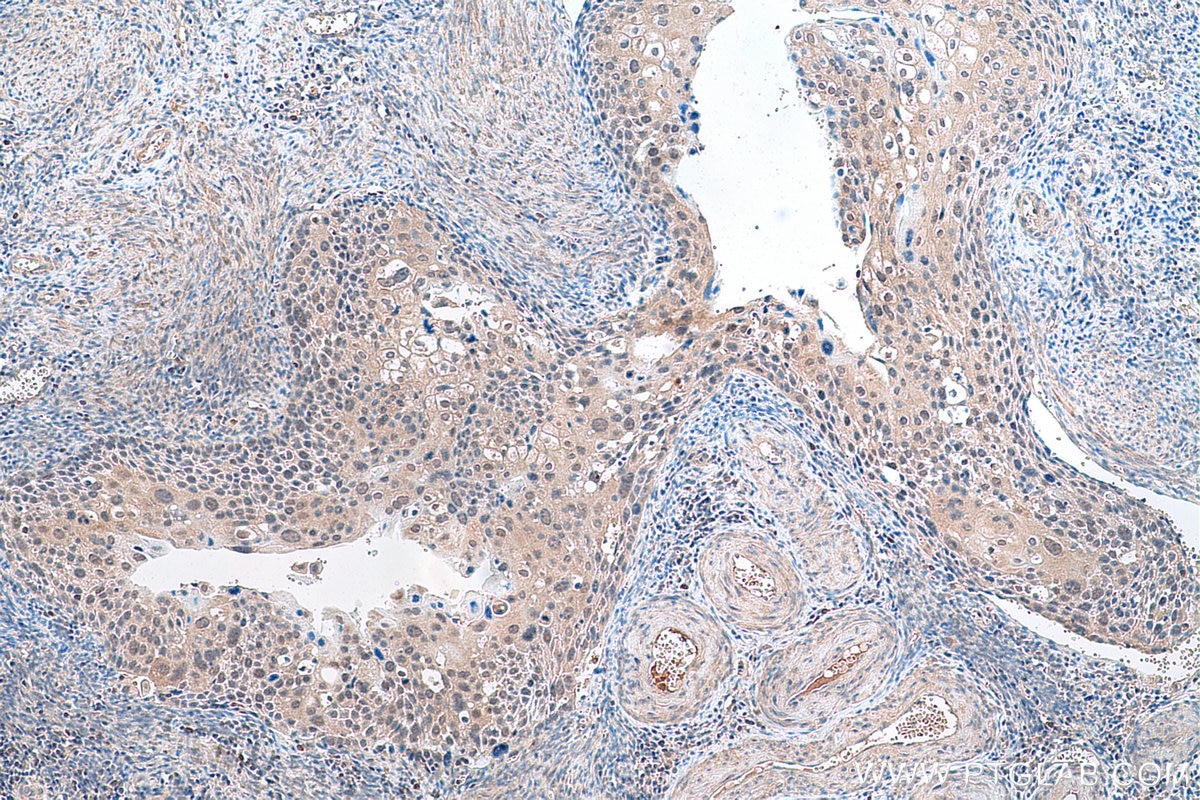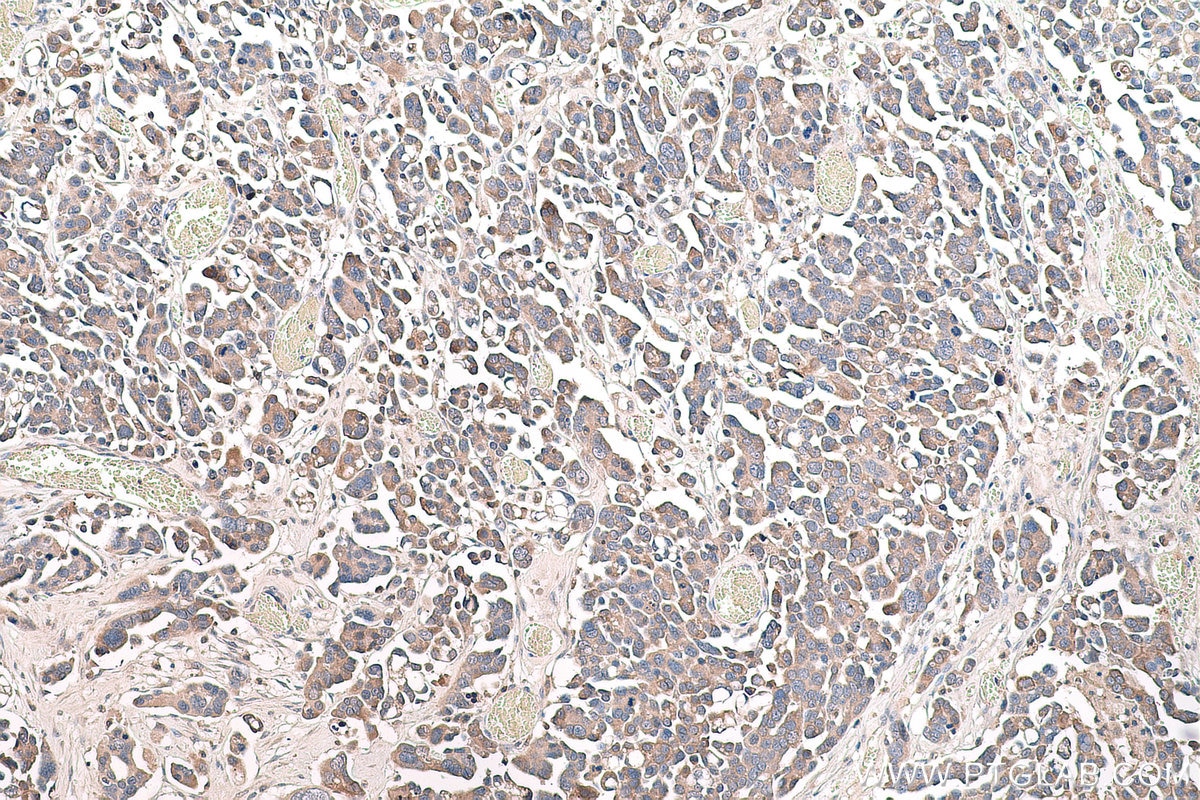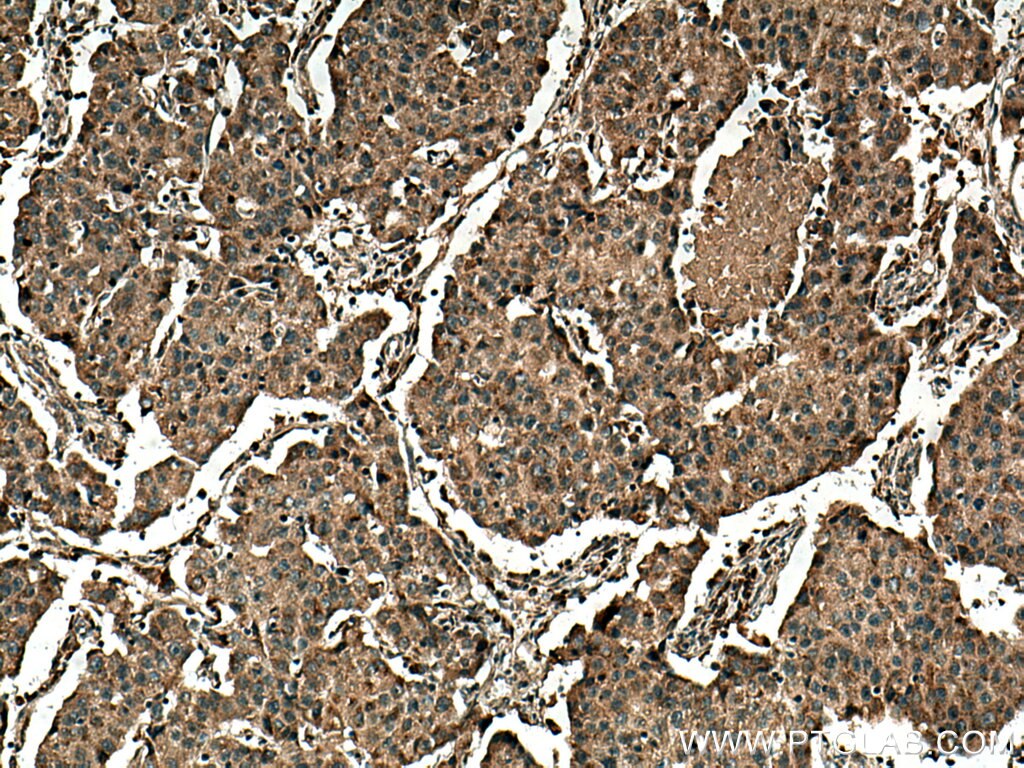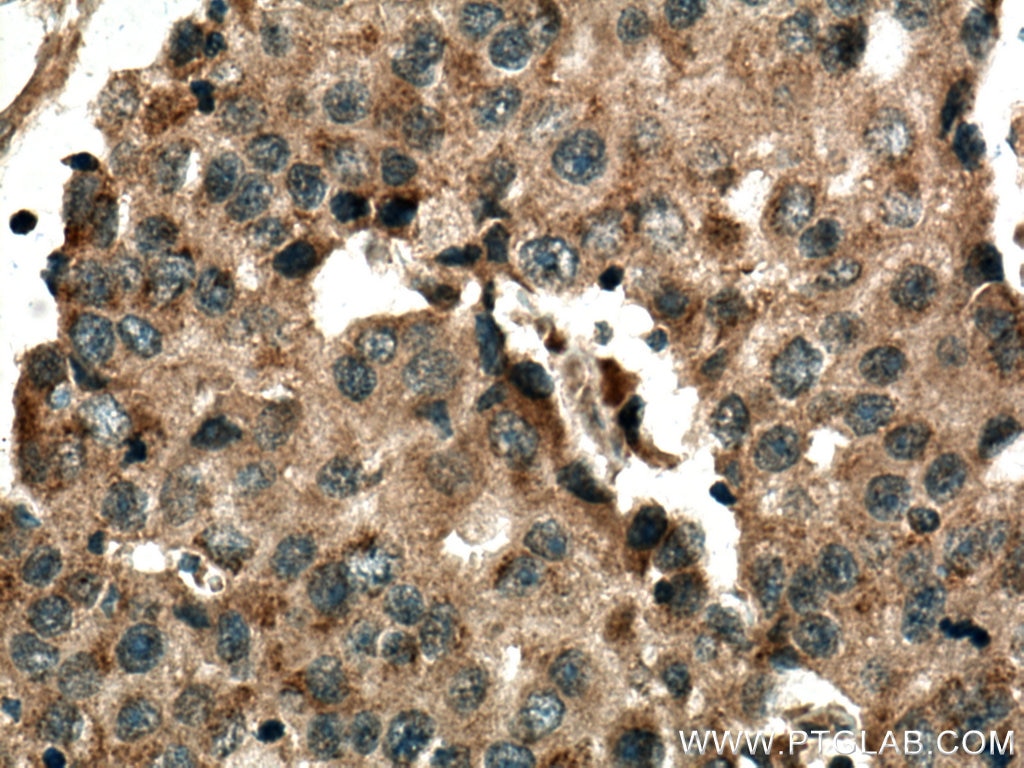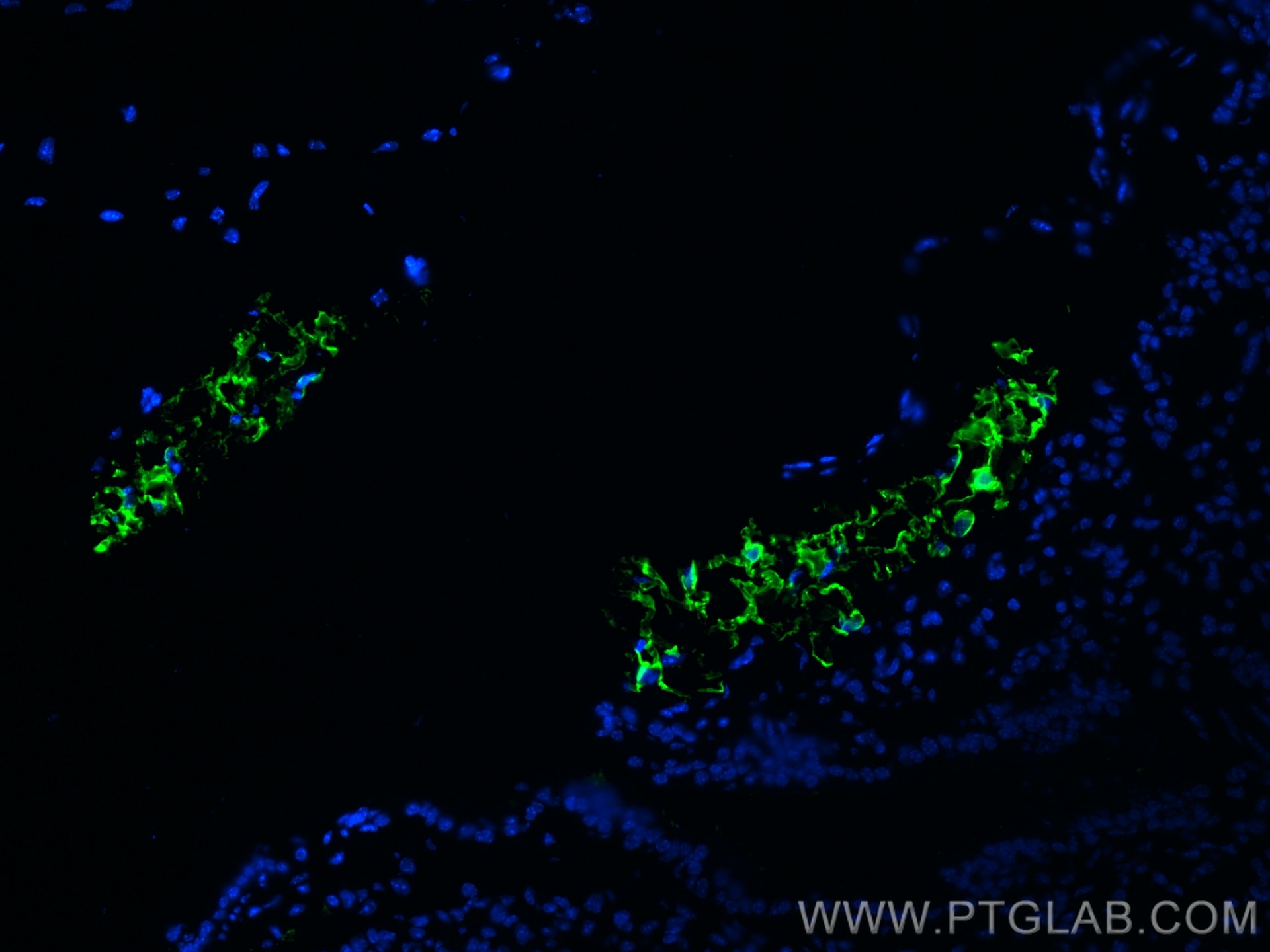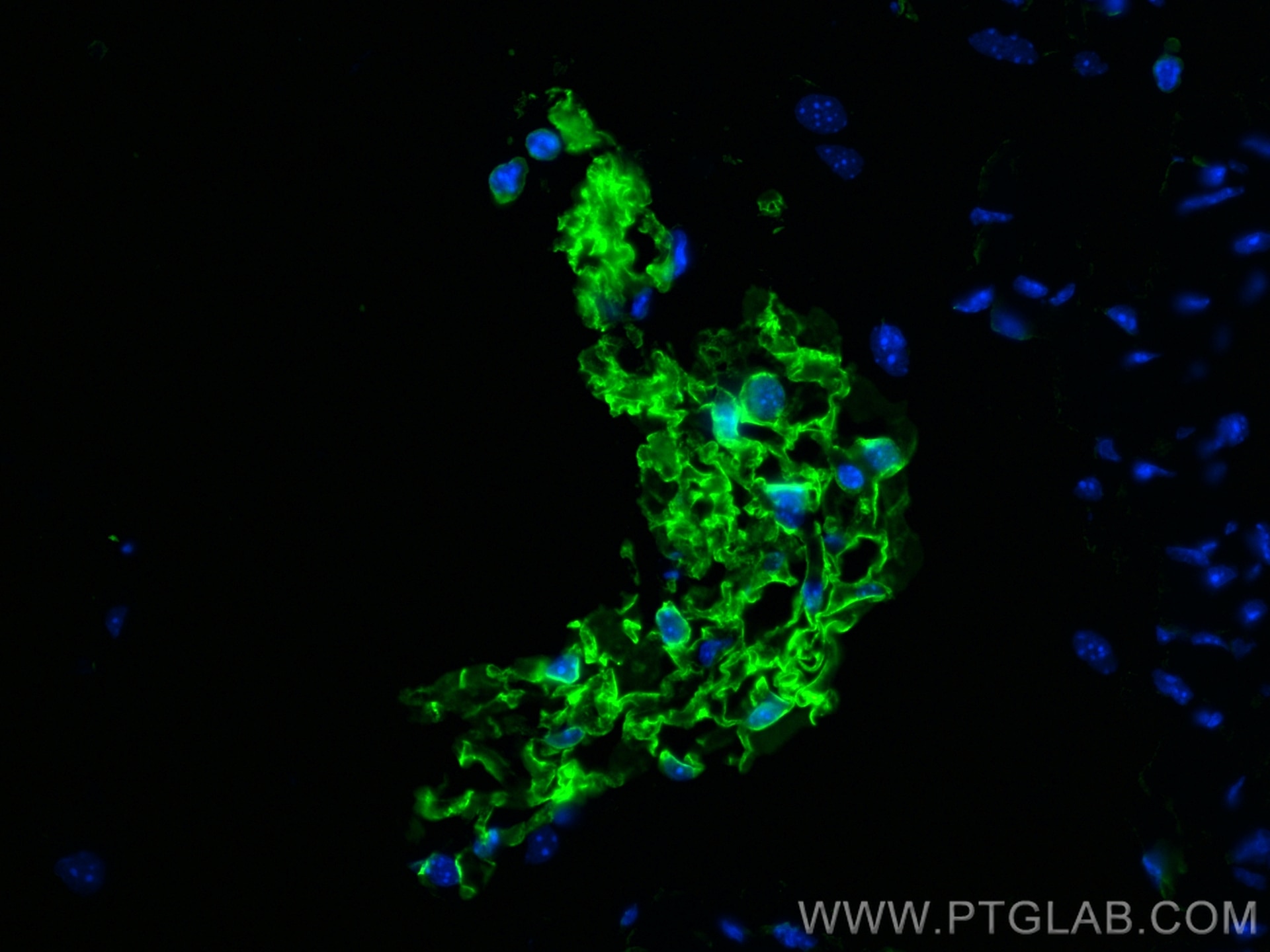- Phare
- Validé par KD/KO
Anticorps Monoclonal anti-COX2/ Cyclooxygenase 2/ PTGS2
COX2/ Cyclooxygenase 2/ PTGS2 Monoclonal Antibody for WB, IHC, IF-P, ELISA
Hôte / Isotype
Mouse / IgG2a
Réactivité testée
Humain, souris et plus (2)
Applications
WB, IHC, IF-P, IP, CoIP, ELISA
Conjugaison
Non conjugué
CloneNo.
3G2B9
N° de cat : 66351-1-Ig
Synonymes
Galerie de données de validation
Applications testées
| Résultats positifs en WB | cellules RAW 264.7, cellules HeLa traitées au LPS, cellules RAW 264.7 traitées au LPS |
| Résultats positifs en IHC | tissu de cancer du col de l'utérus humain, tissu de cancer du côlon humain, tissu de cancer du sein humain il est suggéré de démasquer l'antigène avec un tampon de TE buffer pH 9.0; (*) À défaut, 'le démasquage de l'antigène peut être 'effectué avec un tampon citrate pH 6,0. |
| Résultats positifs en IF-P | tissu pulmonaire de souris, |
Dilution recommandée
| Application | Dilution |
|---|---|
| Western Blot (WB) | WB : 1:1000-1:8000 |
| Immunohistochimie (IHC) | IHC : 1:1000-1:4000 |
| Immunofluorescence (IF)-P | IF-P : 1:200-1:800 |
| It is recommended that this reagent should be titrated in each testing system to obtain optimal results. | |
| Sample-dependent, check data in validation data gallery | |
Applications publiées
| WB | See 180 publications below |
| IHC | See 28 publications below |
| IF | See 23 publications below |
| IP | See 1 publications below |
| CoIP | See 1 publications below |
Informations sur le produit
66351-1-Ig cible COX2/ Cyclooxygenase 2/ PTGS2 dans les applications de WB, IHC, IF-P, IP, CoIP, ELISA et montre une réactivité avec des échantillons Humain, souris
| Réactivité | Humain, souris |
| Réactivité citée | rat, bovin, Humain, souris |
| Hôte / Isotype | Mouse / IgG2a |
| Clonalité | Monoclonal |
| Type | Anticorps |
| Immunogène | COX2/ Cyclooxygenase 2/ PTGS2 Protéine recombinante Ag24721 |
| Nom complet | prostaglandin-endoperoxide synthase 2 (prostaglandin G/H synthase and cyclooxygenase) |
| Masse moléculaire calculée | 604 aa, 68 kDa |
| Poids moléculaire observé | 66-70 kDa |
| Numéro d’acquisition GenBank | BC013734 |
| Symbole du gène | COX2/PTGS2 |
| Identification du gène (NCBI) | 5743 |
| Conjugaison | Non conjugué |
| Forme | Liquide |
| Méthode de purification | Purification par protéine A |
| Tampon de stockage | PBS with 0.02% sodium azide and 50% glycerol |
| Conditions de stockage | Stocker à -20°C. Stable pendant un an après l'expédition. L'aliquotage n'est pas nécessaire pour le stockage à -20oC Les 20ul contiennent 0,1% de BSA. |
Informations générales
COX2 is an enzyme involved in the synthesis of prostaglandins from arachidonic acid.
1. What is the molecular weight of COX2?
The fully N-glycosylated PTGS2 is 72-74 kDa and the aglycosylated is 66 kDa (PMID:19656660). It also
expresses a band of 39 kDa after unspecific cleavage (PMID:17509125). The 50 kDa band of fragmented
PTGS2 has also previously been detected in AD brains (PMID:14724276).
2. Is COX2 post-translationally modified?
COX2 is a subject of post-translational modifications, including phosphorylation, glycosylation, and
s-nitrosylation (PMID: 28939645).
3. What is the difference between COX1, COX2, and COX3?
There are three isoenzymes that have cyclooxygenase activity: COX1, COX2, and COX3. While COX1
is a ubiquitously expressed constitutive enzyme, expression of COX2 is generally low but can be rapidly
induced by various stimuli (as part of infection and inflammatory response) and is controlled by the
transcription factor NFκB. COX3 is an alternative splice variant of COX1 enzyme and is considered
non-functional in humans.
4. I cannot detect COX2 in my sample during western blotting.
Unlike COX1, COX2 expression is inducible by a variety of stimuli including certain growth factors, cytokines,
and proinflammatory stimuli. COX2 basal expression levels may be very low in unstimulated cells. Additionally,
the COX2 half-life time is short and after stimulation, COX2 protein can be quickly degraded to basal levels
(PMID: 10966456), which should be taken into account during experimental design.
5. What is the role of COX2 in cancer?
COX2 is often upregulated in various cancer types and increased expression of COX2 is associated with
greater angiogenesis of solid tumors, increased invasion, and metastasis, as well as decreased host immunity.
6. What is subcellular localization of COX2?
Both COX1 and COX2 are present in the endoplasmic reticulum (ER) and nuclear envelope (PMID: 9545330),
but COX2 has been reported to be more enriched in the nuclear envelope compared to COX1 (PMID: 7738031).
Protocole
| Product Specific Protocols | |
|---|---|
| WB protocol for COX2/ Cyclooxygenase 2/ PTGS2 antibody 66351-1-Ig | Download protocol |
| IHC protocol for COX2/ Cyclooxygenase 2/ PTGS2 antibody 66351-1-Ig | Download protocol |
| IF protocol for COX2/ Cyclooxygenase 2/ PTGS2 antibody 66351-1-Ig | Download protocol |
| Standard Protocols | |
|---|---|
| Click here to view our Standard Protocols |
Publications
| Species | Application | Title |
|---|---|---|
Cell Metab Cooperation between COA6 and SCO2 in COX2 maturation during cytochrome c oxidase assembly links two mitochondrial cardiomyopathies. | ||
ACS Nano Engineered Extracellular Vesicle-Delivered CRISPR/Cas9 for Radiotherapy Sensitization of Glioblastoma | ||
Adv Sci (Weinh) Tryptophan As a New Member of RNA-Induced Silencing Complexes Prevents Colon Cancer Liver Metastasis | ||
J Adv Res Exploiting metabolic vulnerabilities through synergistic ferroptosis and disulfidptosis for breast cancer therapy | ||
Redox Biol The deubiquitinase USP11 ameliorates intervertebral disc degeneration by regulating oxidative stress-induced ferroptosis via deubiquitinating and stabilizing Sirt3 | ||
J Nanobiotechnology Injectable photocrosslinking spherical hydrogel-encapsulated targeting peptide-modified engineered exosomes for osteoarthritis therapy |
